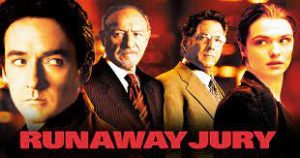Sunday Thoughts on Jury Selection
20th Century Fox.
It’s a rainy Sunday here in Morristown three days removed from completing my second live jury trial post-Covid. Glad to say the jury rendered a verdict in favor of the property owners. I should say former property owners because it was a condemnation valuation trial. That means the jury was called on to decide the amount of just compensation to be paid by the government for the taking of private property.
Having watched the hilarious “Jury Duty” on Amazon recently, and having participated in a jury trial, has me thinking about the process of jury selection.
The big screen’s best rendition of the process has to be Runaway Jury. Cusack, Hackman, Hoffman, Weisz are the celluloid heroes who brought Grisham’s words to life. Spoiler alert, gun manufacturer is on trial in Louisiana and somehow the hero plants a juror on the panel. Pure fiction. The process is SO random, it would be impossible to predict when a trial begins, much less plant a juror on a particular panel.
So, the first random event is the trial date. My case was on the list for trial June 19, 2023. There were at least 100 other cases on the “list.” I couldn’t predict whether I would start on June 19th with any certainty. The Presiding Civil Judge had plenty of judges that day, so we got a judge and were off to the races. That afternoon a panel of 60 jurors was selected for our case. (Jurors appear virtually for selection and lawyers/judges in Courthouse). 60 out of probably 300 jurors who reported for duty that day. Those 60 were randomly selected for our case.
Next, eight jurors are randomly selected from the 60 to be seated in the jury box. Then “voir dire” begins. The ancient practice of speaking to the truth. Each juror participates in voir dire, and each side has 6 peremptory challenges to strike seated jurors. In my case, the government lawyer struck two jurors while I only struck one. When you strike a juror, the seat gets filled by a randomly selected juror. Then after the “panel is acceptable” is both sides, the trial begins.
Of the eight selected, two are alternates, which are randomly selected at the end of the trial. So, you try your entire case to eight jurors, and then if there isn’t agreement on all deliberating, two are stricken at random (by placing numbered wooden blocks in a tumbler (like lottery balls)). I can only remember one case where all jurors did not deliberate. So, in sum, at least in New Jersey, lawyers strike jurors who are randomly selected. The significance of the random nature of a jury’s composition, and its potential influence on the outcome of a trial, can’t be overstated.
Rainy Sunday….? I’m going to watch Runaway Jury!








